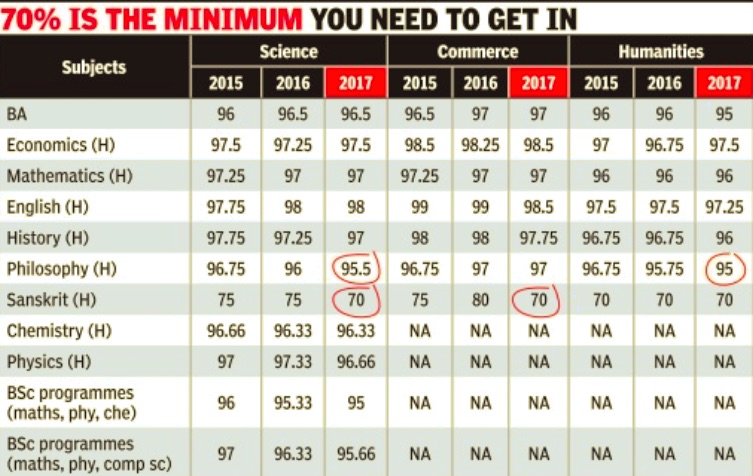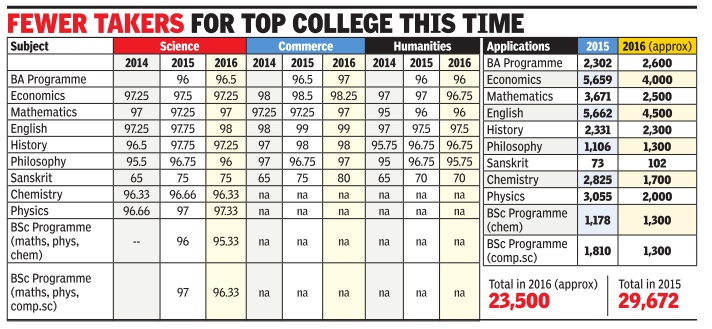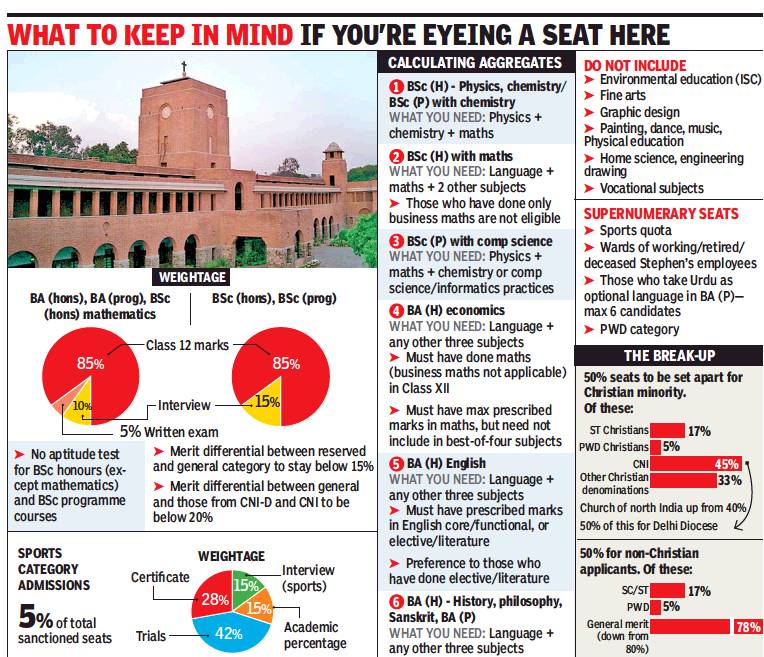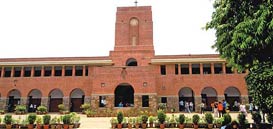St. Stephen's College, Delhi
(→2015) |
(→2016: Drop in number of applicants) |
||
| Line 105: | Line 105: | ||
Some teachers felt that the periodic upheavals the college has gone through and the “general disillusionment“ could be why applicants were deterred, though not many agreed.“The college has an aura of unattainability and that alone attracts many . I don't think the controversies impacted the admission procedure,“ said one of them. | Some teachers felt that the periodic upheavals the college has gone through and the “general disillusionment“ could be why applicants were deterred, though not many agreed.“The college has an aura of unattainability and that alone attracts many . I don't think the controversies impacted the admission procedure,“ said one of them. | ||
| + | |||
| + | =Reservation of seats for CNI, others= | ||
| + | ==As in 2018== | ||
| + | [https://epaper.timesgroup.com/Olive/ODN/TimesOfIndia/shared/ShowArticle.aspx?doc=TOIDEL%2F2018%2F05%2F24&entity=Ar00905&sk=E3AD2991&mode=text Krittika Sharma, No. of general seats dips at Stephen’s, May 24, 2018: ''The Times of India''] | ||
| + | |||
| + | [[File: Criteria for admission to St. Stephen’s College in 2018, including the Reservation of seats for CNI and others.jpg|Criteria for admission to St. Stephen’s College in 2018, including the Reservation of seats for CNI and others <br/> From: [https://epaper.timesgroup.com/Olive/ODN/TimesOfIndia/shared/ShowArticle.aspx?doc=TOIDEL%2F2018%2F05%2F24&entity=Ar00905&sk=E3AD2991&mode=text Krittika Sharma, No. of general seats dips at Stephen’s, May 24, 2018: ''The Times of India'']|frame|500px]] | ||
| + | |||
| + | ''Quota Up For Church Of North India Applicants'' | ||
| + | |||
| + | St Stephen’s College, which started its admissions on May 21, has increased the quota for the applicants from Church of North India (CNI) from 20% to up to 22.5% of the total seats. Non-Christian, general category aspirants, on the other hand, will have 39% of the total seats instead of last year’s 40%. | ||
| + | |||
| + | Being a minority institution, St Stephen’s reserves 50% of its seats for Christian students, including a major chunk for those from CNI. The college’s highest decision-making body is made of CNI members and its chairman is the bishop of Diocese of Delhi. | ||
| + | |||
| + | The cap for CNI applicants has gone up from 40% of the reserved seats for Christian candidates to 45%, with 50% of these seats (11.25 % of the total) being kept for those from CNI-Delhi Diocese, which manages the college, states the 2018-19 prospectus. The principal has also been empowered to fill up vacant seats meant for Christian applicants with any Christian category aspirant. | ||
| + | |||
| + | Of the 50% seats reserved for non-Christians, 78% have been earmarked for the general category, down from 80% last year. The proportion of non-Christian aspirants under the SC/ST category has gone up from 7.5% to 8.5% of the total seats. | ||
| + | |||
| + | The difference in merit cutoffs between general and Christian aspirants have widened with the latter getting up to 20% relaxation. | ||
| + | |||
| + | For supernumery seats, the college will take in three candidates from among the children of the defence personnel who have lost their lives in the line of duty. | ||
| + | |||
| + | The administration has also decided to do away with a written exam for BSc (honours)—except for maths—and BSc (program) courses. | ||
| + | |||
| + | To ensure greater transparency, it has declared the ratio of students versus seat for interviews. For humanities, four applicants — six for Christians — will be called for every seat while for science, six aspirants — eight for Christians — will be interviewed. The interviews are to start with mathematics on June 18 and end with sports on July 6. Verification of all certificates has to be done by July 31. | ||
Revision as of 07:30, 8 June 2018
This is a collection of articles archived for the excellence of their content. |
Contents |
2014
India's no. 2 in Arts
All ranks below indicate the college's position among India's best Arts colleges and were determined by India Today
CITY: New Delhi
Founded on February 1, 1881, St. Stephen's is the oldest college in Delhi. It was first affiliated to Calcutta University, and later to Punjab University. With the establishment of Delhi University in 1922, it became one of its three original constituent colleges.
PARAMETER-WISE RANKING
Reputation: 2
Academic Input: 2
Student Care: 2
Infrastructure: 2
Placement: 2
Perceptual Rank: 2
Factual Rank: 11
2015
India’s no. 1 in Arts
Cut-offs
Cutoffs, 2015-17

St Stephen's College wants to interview more students for a better pool of choice this year for its undergraduate courses. This also explains the dip in cutoff percentages, especially for humanities, in one of the most prestigious and competitive institutions of Delhi University.
The cutoff at St Stephen's is decided on percentages scored by the top lot of students in aparticular course. With just a few top-scoring candidates competing for a single seat, the cutoff percentage is bound to go up.
However, this year, the teachers decided to increase the ratio of students per seat, so that they have more students to interview and select from.
The cutoff for humanities candidates has dipped by around 0.5% this year. The first cutoff for the popular BA (programme) course has gone down to 95% from 96% last year. Similarly , the cutoff for English (honours) has come down to 97.25% from 97.5% last year. The cutoff percentages for all subjects for humanities students have dipped, except Sanskrit that has stayed static at 70%.
For candidates from scien ce background, getting into Stephen's has been made easier. Percentages for chemistry (honours), physics (honours) and the two BSc (programme) courses have also fallen. However, mathematics (honours) has remained at 97%.
AD Mathur, tutor of admissions at St Stephen's, said students who come in subsequent lists get picked because the seats need to be filled. “By the time the last interview takes place, most of our students have taken admission in other colleges. So this time we decided to bring more students in the first few lists and take real interviews instead of just fil ling seats,“ he said.
This year, the ratio has been changed to four students per seat under humanities and six students for sciences. This means even those who ranked below the top scorers will be considered for an aptitude test and interview.
Teachers said that the in terview process has also been streamlined. The interview has a 10% weightage, while the aptitude test has 5%. Nandita Narain, a maths teacher, said the candidate's marks of the aptitude test will be sent to the interview panel. The panel will then ask candidates questions on the aptitude test, among other topics. “This has been done to make the interview less arbitrary. Though some teachers were not in favour of it, it was decided to be adopted nevertheless,“ she added.
2015: Becomes a ‘Society’
The Times of India, Nov 20 2015
St Stephen's set to turn `society' leaf
The draft constitution of St Stephen's Educational Society signifies massive changes in the future running of Delhi's best-known college. The draft, which became public on Thursday , will be tabled at a special meeting of the St Stephen's College governing body on November 23. For starters, the draft pertains to a St Stephen's Educational Society instead of St Stephen's College, itself a society. This society is a new entity that will have a governing body--which is now the college's supreme council -now slightly expanded with seven members instead of six. The supreme council is composed entirely of Church of North India members.
The supreme council will oversee “institutions“, meaning “educational institutions, schools, colleges, universities, medical colleges, research and learning centres established by the society .“ This suggest plans for expansion and St Stephen's College will be one of the institutions each of which will have its own governing body .
The college's governing body, argues lawyer and alumnus Sunil Mathews, is being “left toothless.“ The draft's proposals reduce the teacher repre sentation in the GB. The present GB has four positions for teachers -two elected, two appointed by rotation. The new one, if this draft is passed, will have just two and by rotation.
“The present GB where this will be placed is improperly constituted. The teachers' election couldn't take place at all but decisions are being taken. It is important to have elected members to serve as checks,“ says Nandita Narain, maths teacher, Delhi University Teachers' Association chief.
The GB will have the power to create “new categories of posts other than purely temporary posts“, a provision Mathews sees as violation of the University Grants Commission's norms. “The council used to appoint only the principal and took some decisions on admissions. Now it has most of the powers the GB enjoyed,“ adds Mathews. This list includes powers to “lay down guidelines governing admissions of students and appointment of teaching faculty, control policy, development and direction of the institution(s), to administer the finances and control the income and expenditure of the institution(s). It will also “have the power to veto, over-rule, supersede, amend, modify , and or suspend any decision taken by the governing body .“ As per the original constitution, “The supreme council shall have control of the religious and moral instruction of students and, in addition, shall appoint the principal after proper advertisement.“
“Clearly , the supreme council was never given a role in administrative matters. Our founding fathers wanted to keep the religious aspect separate from academic and administrative matters,“ said Narain.
The principal's role will change too. “The principal shall have and exercise complete control over the discipline of the institution, the courses taught in the college as well as its day-to-day administration,“ says the draft.
However, the principal's role is being expanded in disciplinary matters, originally the GB's province. The principal will act “as immediate authority in all disciplinary matters pertaining to governing body appointees subject to ratification of such action by the governing body and as final authority in respect of all other employees,“ says the draft.The principal has also the power to decide “which staff members shall reside in the institution's staff quarters“ and also recommend for increments. “This is clearly an attempt to throw some of us out of the campus,“ says Narain.
2016: Drop in number of applicants
The Times of India, June 19, 2016

Shreya Roychowdhury
Stephen's applications down by 20%
There has been a major drop in the number of applications for the 410 seats on offer at St Stephen's College this year. Compared with 29,672 applications received last year, as disclosed by the college, there were only aro und 23,500 students who were interested in studying there this year, implying a decline of over 20%. The college authorities “haven't analysed the reasons“ yet, but teachers said the “widespread confusion“ created by the college following an admission schedule different from Delhi Univer sity's might be behind the slide. The applications were last received till midnight of June 17, 2016.
Almost all major disciplines showed a drop in applications. Economics saw a 29% decrease, mathematics 31%, English 20%, chemistry 39%, physics 34%, and BSc Programme (with chemistry) 28%. While the exact figures were not available, the drop in the cut-offs in these subjects reflected the decline in applications. Applications, however, were higher than last year for BA Programme (12%), philosophy (17%), Sanskrit (39%) and BSc Programme (computer science, 28%).
The public information officer of the college, AD Mathur, did not seem perturbed.“The numbers dropping by a few thousand doesn't mean anything because 23,500 is still a huge number considering the very few seats available,“ he said. In contrast, Delhi University , as a whole, received 2,15,525 applications by Saturday evening, and the last date of registration has been extended to June 22.
St Stephen's teachers, however, won't speak on record.They alleged receiving a notice from the college administration forbidding them to discuss admissions with the media. “There was widespread confusion among students,“ explained a senior te acher. “Usually , DU makes it clear on its website that St Stephen's and Jesus and Mary colleges follow a different process, but didn't this time.Nor was the college proactive about publicising the process. Also, earlier our dates were synchronised to those of Delhi University , but this year they weren't. Even today I met a girl who was crying because she thought she had till June 19 to apply .“
Another teacher, who found the disinterest “strange“, said there was talk of the fees having gone up. If true, that could a factor, she said. “But,“ she continued, “we have to see if there's a decline in relation to DU or a decline in the university overall.“
Some teachers felt that the periodic upheavals the college has gone through and the “general disillusionment“ could be why applicants were deterred, though not many agreed.“The college has an aura of unattainability and that alone attracts many . I don't think the controversies impacted the admission procedure,“ said one of them.
Reservation of seats for CNI, others
As in 2018
Krittika Sharma, No. of general seats dips at Stephen’s, May 24, 2018: The Times of India

From: Krittika Sharma, No. of general seats dips at Stephen’s, May 24, 2018: The Times of India
Quota Up For Church Of North India Applicants
St Stephen’s College, which started its admissions on May 21, has increased the quota for the applicants from Church of North India (CNI) from 20% to up to 22.5% of the total seats. Non-Christian, general category aspirants, on the other hand, will have 39% of the total seats instead of last year’s 40%.
Being a minority institution, St Stephen’s reserves 50% of its seats for Christian students, including a major chunk for those from CNI. The college’s highest decision-making body is made of CNI members and its chairman is the bishop of Diocese of Delhi.
The cap for CNI applicants has gone up from 40% of the reserved seats for Christian candidates to 45%, with 50% of these seats (11.25 % of the total) being kept for those from CNI-Delhi Diocese, which manages the college, states the 2018-19 prospectus. The principal has also been empowered to fill up vacant seats meant for Christian applicants with any Christian category aspirant.
Of the 50% seats reserved for non-Christians, 78% have been earmarked for the general category, down from 80% last year. The proportion of non-Christian aspirants under the SC/ST category has gone up from 7.5% to 8.5% of the total seats.
The difference in merit cutoffs between general and Christian aspirants have widened with the latter getting up to 20% relaxation.
For supernumery seats, the college will take in three candidates from among the children of the defence personnel who have lost their lives in the line of duty.
The administration has also decided to do away with a written exam for BSc (honours)—except for maths—and BSc (program) courses.
To ensure greater transparency, it has declared the ratio of students versus seat for interviews. For humanities, four applicants — six for Christians — will be called for every seat while for science, six aspirants — eight for Christians — will be interviewed. The interviews are to start with mathematics on June 18 and end with sports on July 6. Verification of all certificates has to be done by July 31.
